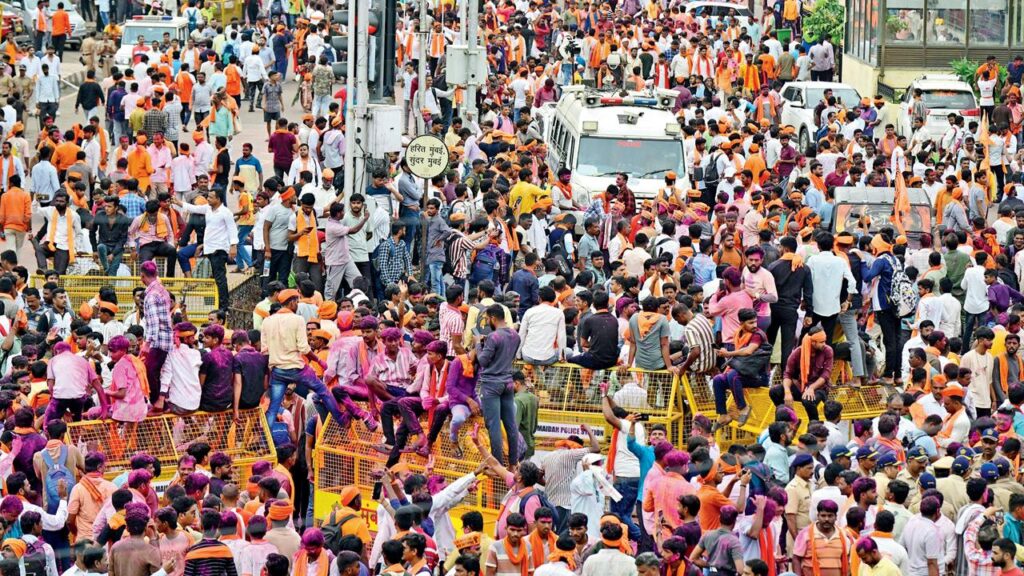Across Maharashtra, from small talukas to big districts and cities, streets are now filled with rallies, processions, and even hunger strikes—all demanding one thing: reservation. The Dhangar community has started protesting for Scheduled Tribe (ST) status. The Banjara community and the Kolis (fisherfolk) are also voicing the same demand.
However, these demands are met with stiff resistance and protests by other communities, who fear that any new inclusion will reduce their own share. Sadly, instead of reducing the inequality gap, reservation is spilling into fresh rivalries. The state is witnessing communities locked in battles for their own share of the quota.
Such is the situation that villages where communities have lived in peace for generations are now witnessing tensions, with old grudges surfacing solely over reservation. Quota politics is pulling communities apart.
Many experts see the implementation of the Mandal Commission as a turning point for the reservation issue. The Maratha community’s demand intensified in the early 2000s when the Kunbi (an agrarian sub-caste) was officially granted OBC status. Of the 12 crore plus population in Maharashtra, 28 percent are Maratha, while 53 percent belong to the OBC category.
Despite having a ceiling of 50 percent for reservation, many states, including Maharashtra, have breached this limit. Yet, political promises continue to stretch these boundaries. Maharashtra currently has 52 percent reservation for SC, ST, Vimukt Jati, Nomadic Tribes, and OBC. In addition, a 10 percent reservation for Marathas (socially and economically backward class) takes the total reservation to 62 percent.
Maharashtra has always been referred to as the land of reformers. History reminds us of several stalwart reformists and leaders, including Mahatma Jyotiba Phule, Shahu Maharaj, and Dr. B.R. Ambedkar, who fought to break the caste system and barriers and worked tirelessly for the upliftment of the marginalized. The goal was inclusion, not rivalries.
However, as political parties have changed the definition of reforms, reservation is now being seen as one of the major elements that define electoral issues. Even if framed as justice, the bigger motive often revolves around benefiting one’s own community. Political parties, instead of coming together to find an amicable solution, are milking the situation as they view the divide among communities as an opportunity to create vote banks.
When the ruling regime, the BJP-led Maharashtra government, called for an all-party meeting on the Maratha reservation issue, the opposition remained absent from the discussion. Ideally, one would expect leaders to seek votes based on vision and development. Instead, they are asking for votes in the name of caste.
Chief Minister Devendra Fadnavis’s reaction clearly reflects political posturing. Last week, Fadnavis claimed that the government decision had not touched or altered any quota, adding, “But if anyone still wants to play politics over it, what can be said?”
According to media reports, OBC strongman and state minister Chhagan Bhujbal has openly urged the community to teach lessons to Maratha leaders backing quota activist Manoj Jarange. On the other hand, Jarange has instructed all Marathas to ensure the defeat of OBC leaders opposing their demand. This is a clear indication that society continues to prioritize caste over policy and progress.
For now, such parties may see short-term gains in popularity and electoral votes. But in the long run, this approach will certainly erode social trust.
Everyone in society needs to be taken into confidence and reminded that reservation is not the only path to progress or a quality life. Creating more employment, education, and job opportunities, alongside quota, are essential if society is to witness real results and changes.
Phule fought for education, Shahu Maharaj sought to break caste monopolies in Kolhapur, and Ambedkar’s cause was to bring equality and dignity. If Maharashtra wishes to retain its tag as a reformist state, then the time has come for all political parties, community leaders, organizations, and civil society to come together.
Along with reservation, making education affordable, improving its quality, ensuring wide access for everyone, upgrading the skills of youth, and addressing unemployment by providing more opportunities are vital steps for the state to rediscover the vision and spirit of reform.
If ignored, the gap will widen, rivalries between communities will rise, and the social fabric will be torn beyond repair.
https://www.mid-day.com/news/opinion/article/quota-politics-of-divide-and-rule-23594907

